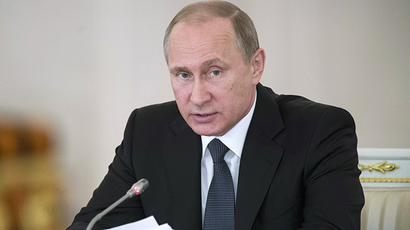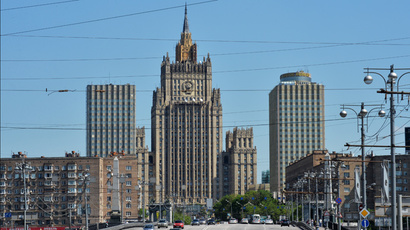Upper house readies bill allowing for expulsion foreign citizens over 'undesirable behavior'

Russian senators are working on a bill that, if passed, would introduce a definition of ‘undesirable behavior’ of foreign citizens punishable by forced expulsion from the country.
The head of the Upper House commission for protection of state sovereignty and prevention of foreign intervention into Russia’s internal affairs, Senator Andrei Klimov, has told Izvestia daily that the new draft would contain amendments to the existing law on undesirable foreign groups and that it could be ready as soon as early 2018.
According to Izvestia’s own unnamed sources the new bill would define undesirable behavior as any activities that could compromise national security, such as inciting ethnic and religious hatred, potential interference with elections and attempts to influence educational institutions and the younger generation in general.
“Our partners across the ocean are systematically intervening in our affairs. Now we are monitoring the pre-election situation, and analyzing the methods that they have used to interfere with Russia’s internal affairs. In particular, we want to monitor the movement of money being sent from Washington to maintain the activities of various organizations,” Senator Klimov said.
In subsequent comments to the TASS agency, Klimov added that foreign governments had attempted to circumvent the introduction of a law in Russia limiting the activities of organizations with “foreign agent” status. He said the aim is to change the internal political situation in the country by proxy, using persons with non-Russian citizenship. The new bill could oppose these measures by introducing responsibility for foreigners who are engaged in “destructive activities” or attempting to influence Russian internal politics.
At the same time he emphasized that the planned restrictions could apply only to foreigners, as the Russian constitution expressly forbids restricting citizens’ activities or preventing them from entering the country.
First deputy head of the Upper House Committee for Constitutional Law, Senator Aleksey Aleksandrov told RIA Novosti that the committee was ready to support the bill allowing for expulsion of foreign citizens engaged in undesirable actions. He added the caveat that the final draft of document should be immaculate in the legal sense. The senator said that Russia’s need for protection from internal and external threats was obvious, listing information attacks and provocations as examples of possible hostile actions.
In May 2015 Russia introduced a law that allows the Prosecutor General’s Office and the Foreign Ministry to create a list of proscribed “undesirable foreign organizations,” making the activities of such groups in Russia illegal. The main criterion for putting a foreign or international NGO on the list is a “threat to the constitutional order and defense capability, or to the security of the Russian state.”
Non-compliance with the ban can be punished by administrative penalties, and repeated and aggravated offenses can carry prison sentences of up to six years. Russian citizens and organizations that work with banned groups would face administrative fines only.
Russian and international rights advocates as well as the European Union and the United States have expressed their concern over the new law, stating that the ban on cooperation with foreign NGOs could lead to the isolation of the Russian people from the outside world. The sponsors of the bill replied that it was more of a preventive measure and it was not targeting any particular organizations.
Another act, introduced in late 2012 and known as the “Foreign Agents Law”, orders all NGOs engaged in Russian politics and receiving any funding from abroad to register as foreign agents or risk substantial fines. Groups with “foreign agent” status are banned from sponsoring Russian political parties, but otherwise their activities are not restricted.














